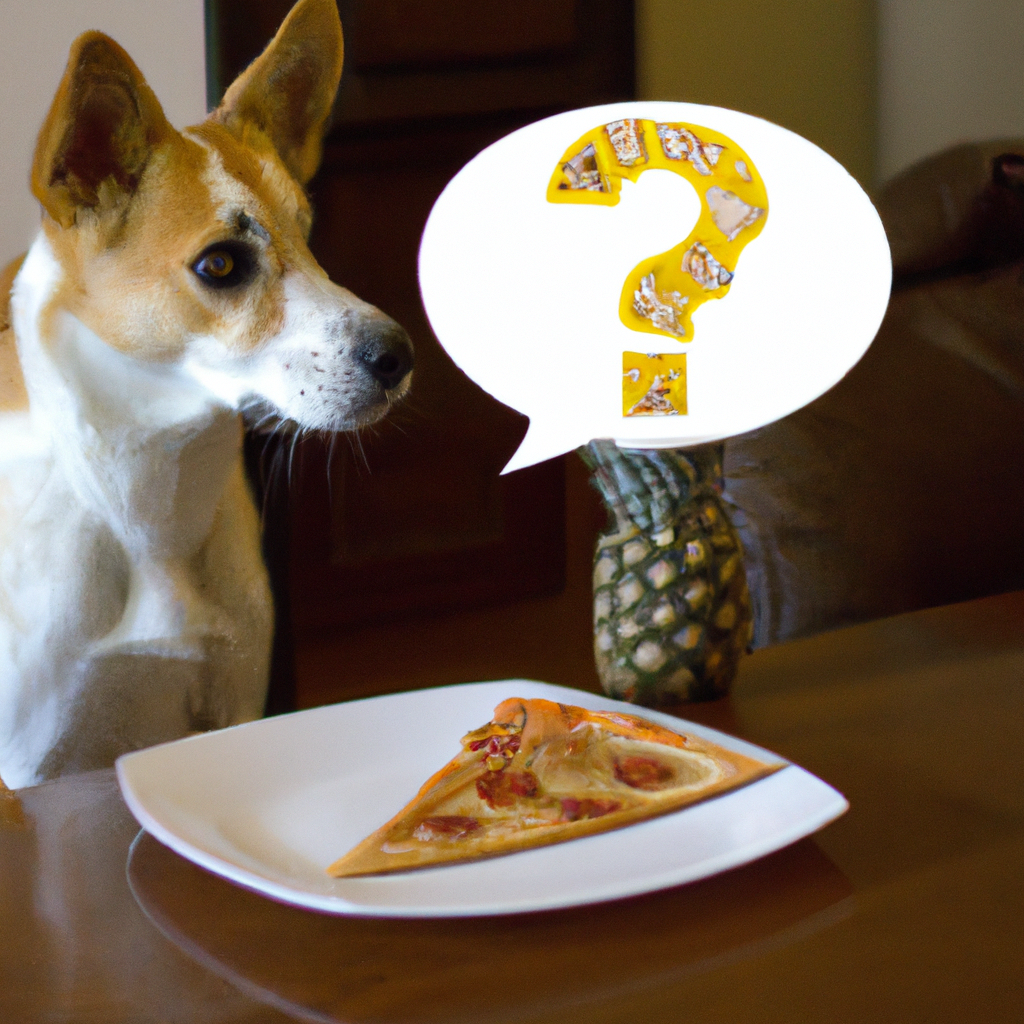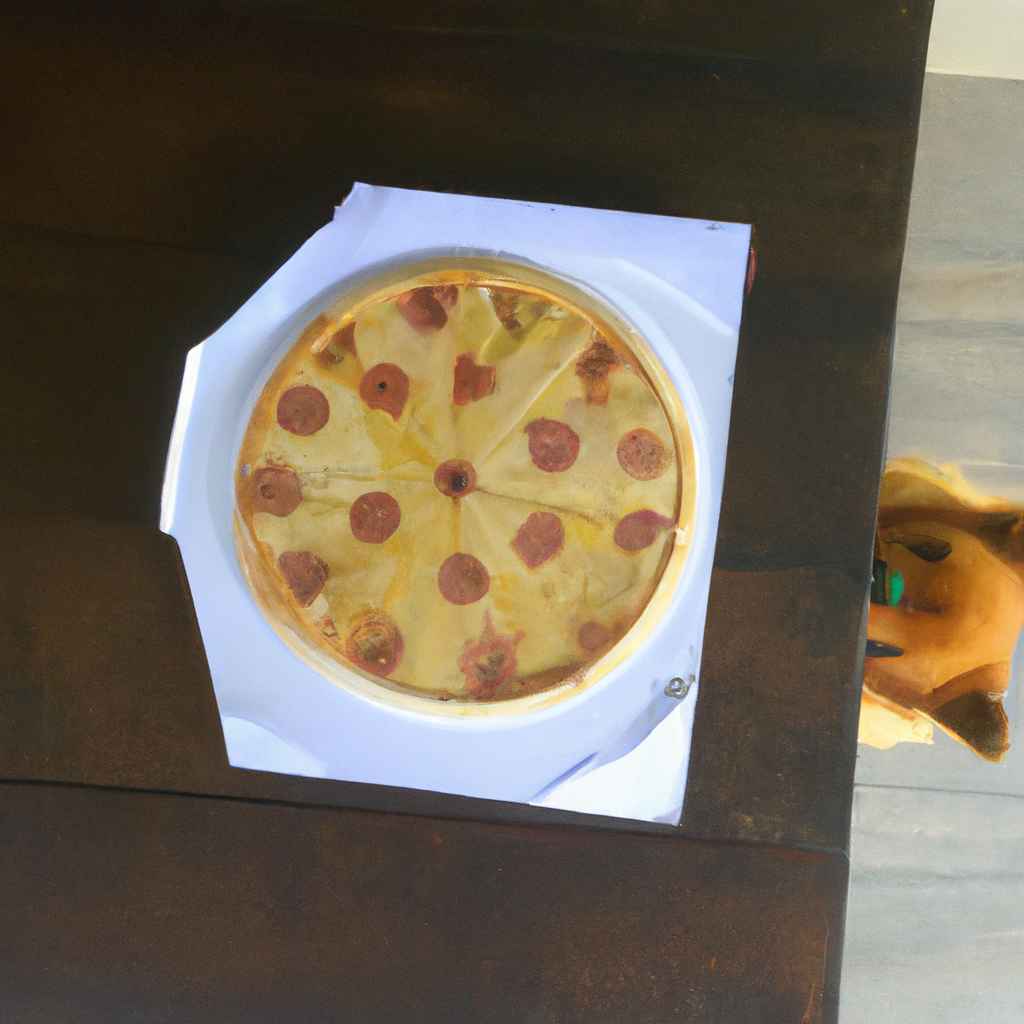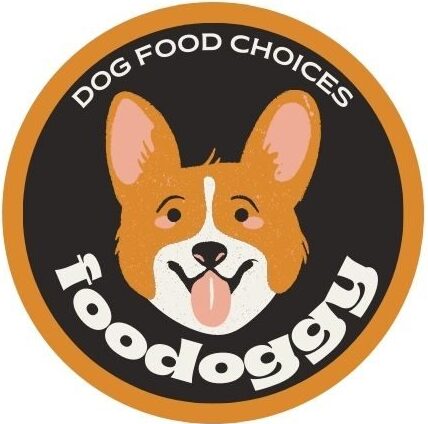Do you often find yourself sharing a slice of your beloved pineapple pizza with your furry friend? You might think you’re treating your pet to a delightful snack, but is it really safe for them? The topic of dogs consuming human food is a contentious one, and when it comes to pineapple pizza, it’s no different. It’s crucial to understand what our canine companions can safely consume, not just for their immediate well-being but also for their long-term health.
We all want what’s best for our dogs. They’re not just pets; they’re family. And just as we wouldn’t want our family members to eat anything hazardous, we must extend the same consideration to our dogs. This article aims to address the question – ‘Can Dogs Eat Pineapple Pizza?’ in a comprehensive manner, providing you with the necessary information to make an informed decision. So, before you hand over that next slice, take a moment to read on and learn more. After all, knowledge is power, and in this case, it could be the key to your pooch’s health and happiness.

How Much Pizza Can Dog Eat?
While you may wonder, Is Pizza Safe for Dogs?, the answer isn’t straightforward. Overindulgence can lead to serious Risks of overfeeding pizza including obesity, pancreatitis and other health issues. Moreover, certain Pizza ingredients harmful to dogs like garlic and onions can be extremely dangerous. Pizza’s impact on a dog’s weight is undeniable, as it’s high in fats and carbs. The Long-term effects of pizza diet can lead to chronic health problems, reducing your pet’s lifespan. Therefore, for your dog’s health, pizza should be an occasional treat, not a dietary staple.
Is Pizza Safe for Dogs?
Shifting gears slightly, let’s now address a critical question: Is Pizza Safe for Dogs? As dog owners, we all want the best for our furry friends. But when it comes to sharing a slice of pizza with them, it’s crucial to understand the potential risks involved.
From a general perspective, pizza is not toxic to dogs. However, it’s not a proper diet for them either. Dogs have different nutritional needs than humans, and pizza cannot meet these requirements. It’s high in fats and sodium, which can be harmful to dogs in large amounts. Furthermore, certain ingredients like garlic and onions are known to be toxic to dogs.
In conclusion, while an occasional small piece of pizza likely won’t hurt your dog, it’s best to avoid making it a regular part of their diet. Instead, opt for dog-friendly treats that are specially formulated to meet their nutritional needs. This way, your dog can still enjoy a tasty treat without the potential risk.
Can Dogs Eat Pineapple Pizza?
Having tackled the question of how much pizza a dog can safely consume, let’s now delve into a more specific aspect of the topic: pineapple pizza. Can dogs eat pineapple pizza? Should they? Let’s break it down.
Firstly, understand that dogs do not have the same digestive systems as humans. What might be a delicious treat for us, could potentially be a health hazard for our furry friends. Pineapples, in small amounts, are generally safe for dogs. They provide essential vitamins and minerals that are beneficial for their health. However, pineapple pizza is a different story.
The problem lies in the additional ingredients found on a typical pineapple pizza. Cheese, ham, and pizza dough are not recommended for dogs. Cheese is high in fat, which can lead to obesity and pancreatitis. Ham, on the other hand, is high in salt and can cause serious issues like bloating. Pizza dough is high in carbs, which dogs don’t need in large amounts.
To make matters worse, pizzas often contain garlic and onion, which are toxic to dogs. Even a small amount could lead to serious health problems.
So, do you love your canine companion? If so, say no to pineapple pizza for dogs. Their health is not worth the risk. Instead, treat them with dog-safe fruits and veggies.
Read More About: Why is pedigree bad for dogs?
What Are the Dog-Safe Ingredients in a Pizza?
It’s crucial to know what pizza ingredients are harmful to dogs’ health. With this knowledge, you can confidently create a dog-friendly pizza, ensuring your pet joins in the fun without harming their health. Let’s discuss the safety of cooked turkey and how to integrate it into your dog’s diet. Additionally, we’ll explore canine-safe herbs that can add flavor to their meals. Lastly, we’ll highlight the benefits of water-packed tuna, a delicious and nutritious option for your furry friend. Making dog-safe pizza is not only possible, but it’s also a loving gesture towards your pet’s wellbeing.
What Pizza Ingredients Are Harmful to Dogs’ Health?
Transitioning from the pineapple pizza debate, it’s crucial to be aware that certain ingredients found in pizza can be dangerous to your furry friend. Onions and garlic, for instance, are toxic to dogs, damaging their red blood cells and potentially leading to anemia. Likewise, grapes and raisins – although not common pizza toppings – can cause kidney failure in dogs.
However, the most commonly used pizza ingredient that is harmful to dogs is cheese. Dogs lack the enzyme to properly digest lactose, which can lead to digestive upset or even pancreatitis. Furthermore, the high fat content in cheese can contribute to obesity and other health issues.
Lastly, processed meats such as pepperoni or sausage, are high in sodium and fat, which can be harmful to dogs in large quantities.
For the sake of your pet’s health, please refrain from giving them these ingredients. Let’s focus on creating a pizza that’s not only delicious, but also safe for your canine companion.

How to Make Dog-Friendly Pizza
Now that we have established that pineapple pizza may not be the best choice for your furry friend, let’s explore how to make a pizza that will be both delicious and safe for your dog. Making a dog-friendly pizza could not only be a fun activity for you and your pet but also ensures that your dog is not consuming anything harmful.
To start, choose a whole grain crust that is free from added sugars and salt. This will provide your pet with healthy fiber and nutrients without the unnecessary additives. Instead of traditional pizza sauce which may contain ingredients harmful to dogs, opt for a pureed pumpkin or sweet potato base. Both are excellent sources of vitamins and fiber for your dog.
For toppings, stick to lean meats like turkey or chicken and avoid processed meats, which can contain harmful preservatives. As for cheese, use it sparingly as too much dairy can upset your dog’s stomach.
Remember, your dog’s health is worth the extra effort.
What Happens when a Dog Eats Pizza?
Having established the dog-safe ingredients in a pizza, it’s crucial to understand the adverse consequences that can arise when your beloved pet indulges in this human treat. Consider this scenario: you’re enjoying a delectable pizza, and your dog, tempted by the enticing aroma, comes begging for a bite. While the pleading eyes may be hard to resist, succumbing to their charms could lead to serious health issues for your furry friend.
Pizza is not pet food. The main ingredients in pizza – cheese, garlic, onions, and various other toppings – are all harmful to dogs. Cheese is high in fat, which can cause pancreatitis in dogs. Garlic and onions are toxic to dogs, causing various ailments like anemia. Furthermore, the high sodium content in pizza can lead to dehydration and sodium ion poisoning in dogs.
Your dog’s health should be a non-negotiable priority. By feeding them pizza, you are risking their wellbeing, possibly leading to frequent, expensive vet visits, and worse, a shortened lifespan. The emotional toll of seeing your beloved pet suffer is immeasurable.
Consider these dire implications before sharing the next slice. Prioritize their health over momentary satisfaction. Don’t let the guilt of saying no to those puppy eyes overshadow the potential harm. *Remember, a healthy dog is a happy dog.
How Is Pineapple Beneficial for Dogs?
While it’s clear that pizza is a problematic treat for our canine friends, there are other, healthier food options that can provide surprising benefits. Let’s pivot to a more unexpected food item – the pineapple.
Pineapple, unlike pizza, offers a multitude of health benefits for dogs. Rich in vitamins, minerals, and fiber, this tropical fruit is more than just a tasty treat. It’s a powerhouse of nutrients that can enhance your dog’s overall health.
Pineapple is packed with vitamin C, which boosts the immune system and helps combat various diseases. Its high fiber content aids digestion, preventing constipation and maintaining a healthy weight. Additionally, the bromelain enzyme found in pineapple can break down proteins in the stomach, promoting a healthier digestive tract.
But, it doesn’t end there. Pineapple can also act as a deterrent against coprophagy, the unpleasant habit some dogs have of eating their feces. The enzyme bromelain gives feces an unpalatable taste, discouraging this behavior.
However, remember that moderation is key. While pineapple is beneficial, it should not replace a balanced diet. Use it as a treat or food topper, but make sure your dog’s primary diet consists of high-quality dog food.
Overview of the Nutritional Value of Pineapple
While the health benefits of pineapples for your furry friend are enticing, it’s imperative to understand the nutritional powerhouse these tropical fruits are. Let’s delve into the compelling facts about the nutritional value of pineapple.
Pineapples are a treasure trove of vitamins and minerals. They are packed with vitamin C, which is a potent antioxidant that protects your dog’s cells from damage and strengthens their immune system. Pineapples also contain an impressive amount of manganese, a mineral vital for bone and cartilage formation. Your furry buddy will definitely thank you for this.
Additionally, pineapples are rich in dietary fibers. These fibers not only aid in digestion but also contribute to weight management, making them an excellent choice for overweight dogs. The vitamin A present in pineapples is beneficial for your dog’s vision, skin, coat, and immune system.
Moreover, pineapples have an enzyme called bromelain. This unique enzyme aids in protein digestion and has anti-inflammatory properties, which can help soothe your dog’s upset stomach and reduce joint inflammation.
In essence, adding a small amount of pineapple to your dog’s diet can be an amazing source of vital nutrients and significantly improve their health. So why not give it a try? *Let the pineapple’s nutritional wonders work their magic on your beloved pet!
Potential Health Risks of Feeding Pineapple Pizza to Dogs
While the nutritional benefits of pineapple make it a delightful addition to your diet, the story changes when it comes to our furry friends. Let’s delve into the potential health risks of feeding pineapple pizza to dogs.
Pizza is not a safe food for dogs, and it’s not just because of the pineapple topping. The dough is often made with yeast, which can cause bloating and discomfort in dogs. The cheese and meats used as toppings are typically high in fat and salt, both of which can lead to obesity and heart disease in dogs.

Adding pineapple to the mix only complicates matters. While dogs can eat small amounts of pineapple without issues, the fruit is high in sugar. Too much sugar can lead to diabetes and obesity in dogs. Furthermore, the citric acid in pineapple can upset your dog’s stomach, leading to vomiting or diarrhea.
We all love to spoil our pets, but feeding them pineapple pizza is a dangerous indulgence. Instead, stick to foods specifically designed for dogs. They will be much healthier and happier in the long run.
It’s hard to resist those puppy dog eyes, but remember the golden rule: Your dog’s health should always come first. Beware the risks and choose wisely what you feed your beloved pet.
Potential Benefits of Feeding Pineapple Pizza to Dogs
While it’s crucial to be aware of the potential health risks of feeding pineapple pizza to dogs, it’s equally important to explore the possible benefits. Let’s delve into the other side of the coin and discover the potential advantages of this controversial treat.
Contrary to popular belief, feeding your dog pineapple pizza in moderation can be beneficial. Pineapple, an essential ingredient in this pizza, is packed with vitamins A and C, and manganese. These nutrients are known to boost a dog’s immune system and help in the metabolic process. The cheese used in pizza is a good source of calcium and protein, contributing to bone health and muscle growth.
However, we must emphasize the phrase in moderation. Overfeeding can lead to obesity, but a small slice now and then can be a tasty treat that brings variety to your dog’s diet.
Moreover, giving your furry friend a slice of pineapple pizza can strengthen your bond. Sharing food with dogs is often seen as a sign of love and trust from their perspective. You’re not just feeding them; you’re showing them affection.
Therefore, rather than totally ruling out pineapple pizza, consider it as a special treat. Remember, it’s the overconsumption that’s harmful, not the pizza itself.
Read More About: Can Dogs Eat Popcorn with Salt?
Tips for Feeding Pineapple Pizza to Dogs
Now that we’ve explored the potential benefits of feeding pineapple pizza to dogs, it’s time to look at how you can do it safely and effectively. This will ensure your furry friend enjoys this unique treat while also reaping its benefits.
Firstly, moderation is key. Just like with any other treat, pineapple pizza should not make up a significant portion of your dog’s diet. Offering a small piece occasionally will keep this treat special and exciting for your pet.
Secondly, ensure the pizza is free from harmful ingredients like onions, garlic, and excessive amounts of cheese. Remember, some ingredients we humans enjoy can be toxic to dogs. Always prioritize your dog’s health and safety!
Thirdly, you might consider making a dog-friendly version of pineapple pizza at home. This way, you control what goes into it, ensuring it’s both healthy and delicious for your canine companion.
By following these tips, you’ll be able to treat your dog with a slice of this tropical delight while ensuring they stay healthy and happy. So, go ahead and introduce your pet to the world of pineapple pizza. They might just love it as much as we do! Remember, it’s not just about feeding your dog, it’s about creating joyful experiences together. Embrace this opportunity to bond with your pet in a unique and delightful way.
Alternatives to Pineapple Pizza for Dogs
While we’ve navigated through the intricacies of feeding pineapple pizza to our furry friends, we must remember that not all dogs may take to this food. Our pets are unique, and their tastes can be as diverse as ours. It’s essential to have alternatives at hand that are equally nutritious and enjoyable for them.
Let’s explore some delicious and safe alternatives to pineapple pizza for your dog. Consider homemade dog food; it gives you complete control over the ingredients, ensuring your dog’s diet is balanced, healthy, and free from unnecessary additives. A simple recipe could be a mix of lean meats like chicken or turkey, with healthy vegetables like sweet potatoes and peas.
Bake your own doggie treats. By doing this, you can avoid additives, preservatives, and high sugar content found in store-bought treats. One popular recipe includes pumpkin and peanut butter – both dog favorites!
Finally, look for high-quality store-bought dog food. Many brands offer grain-free, organic options that prioritize whole food ingredients.
Remember, your dog’s health should always take precedence. Every dog is different, and what works for one might not work for another. If your pet displays any unfavorable reactions to a food change, consult your vet immediately. Let’s prioritize our pets’ wellbeing above all else – they deserve nothing less.
Conclusion
In conclusion, while pineapple pizza may be a tasty treat for humans, it’s not the best choice for our canine companions. Pizza, in general, can be high in fats and sodium, which can lead to health problems in dogs. The processed ingredients can also cause digestive issues and other complications.
However, pineapples themselves can offer some nutritional benefits for dogs if given in moderation. It’s always best to consult with your vet before introducing new foods into your pet’s diet. Consider healthier alternatives to pineapple pizza to keep your pup happy and healthy.
